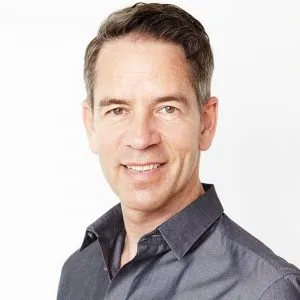'The innovation focus is shifting from Europe and the US to Asia'
Approximately 1,600 German companies are active in India. They employ more than 400,000 experts in India. On the other side, more than 110,000 people in Germany either are of Indian decent or even hold an Indian passport. Especially in the startup epicentre Berlin, students, tech experts and entrepreneurs from India are welcomed with open arms. To link the startup ecosystems Berlin and India even further, the city of Berlin kicked off a special exchange programme. We talked with Rainer Seider, Head of the Unit on Foreign Trade, European Economic Policy & Development Cooperation at the Ministry for Economics, Energy and Public Enterprises of Berlin.

YS: Thanks for talking with us, Rainer. You have been a champion for Asia for many years now.
Rainer: Yes! My heart beats for Asia. I have been in charge of the Asia-Pacific Week for 20 years now. From a small conference to a large dialogue between continents. We started in 1997 not even 10 years after the fall of the Berlin Wall and within the East Asia financial crises.
YS: India played a big part in the last two years and you turned into one of the biggest champions in Berlin for Indian relationships. Why India?
Rainer: Maybe a bit by chance. The current strong India ties are a product of the Asia-Pacific Week 2016. I met key players in Berlin like Mohadi from Battlesmart or Angela De Giacomo from Wundernova. At the same time, we started 'StartUp Asia Berlin', another programme that is reaching out to influencers in Bengaluru, Manila and Jakarta, as well as the roundtable 'Berlin-Bangalore' supported by Bertelsmann Foundation. What started as a small gathering, became a great event format. With all these programmes I discovered that India is a huge ecosystem, a huge market, a big country, a complex country – and last but not the least it is now getting ripe for international cooperation as the big interest from the Indian government highlights.
YS: What has changed?
Rainer: I was surprised how popular Prime Minister Modi is in the business community. And I learnt from Indian-German experts that capital is going back to India and Indian startups and Indian people do not kick off companies in Silicon Valley anymore. They are going back to India to invest, start a company and there are many Indian-Americans who are investing their funds in America and India as well. If the smart brains of India stay in India instead of going to the US, it is a good sign for having trust in the Indian startup ecosystem.
Berlin is a rather young startup ecosystem compared to Silicon Valley, but it has matured a lot in the last three years and provides a lot of great opportunities.
YS: So if Indian entrepreneurs have a green field in India, why should they come to Berlin? What do you think as a representative from the city makes Berlin so special, and what does the city do to welcome international founders?
Rainer: Berlin is a rather young startup ecosystem compared to Silicon Valley, but it has matured a lot in the last three years and provides a lot of great opportunities. When we presented Berlin in New York just a few years ago, a lot of people talked about having no mature companies, about the lack of mentoring and peering, about having not enough capital. That has changed. Many startups in Berlin introduced English as the company language because of the talents they hire to grow – and these experts are coming from all over the world, including India. All the documents are in English now, so you don't have to translate for internationalisation. If you go global to look for talents, investors and market you can’t waste valuable time to change your business into English.
Moreover, with the growing experience, startup people share their failures and successes – which has not been very typical for the German business environment up to now. This has changed a lot in the last three years. Today, Berlin is for many reasons an ideal place for talents. Although money is always a bottleneck for startups the Berlin ecosystem has become very attractive for international investors in the last years too. I am convinced this development also gives hope to other young startup ecosystems that are not yet as ripe as Berlin and do not evolve quite as fast - especially in Indonesia and the Philippines – to mention two of the other countries I am focussing.
YS: Some ecosystems are super big and your approach is to talk to influencers to get access to an ecosystem. Any thoughts on the ecosystem in India you discovered so far?
Rainer: The ecosystem in India is very widespread. In Germany, Berlin is the startup epicentre. Seventy percent of the money within the ecosystem of Germany is going to Berlin. India, on the other hand, is very complex: Bengaluru is very IT-driven. And you also have Mumbai as the industrial centre, where a very big startup ecosystem is growing. There is, of course, the capital, Delhi. Another interesting ecosystem has grown in Hyderabad and there are many newcomers. So India is getting more complex year by year.
In Germany, Berlin is the startup epicentre. Seventy percent of the money within the ecosystem of Germany is going to Berlin.
However, I have the impression that since India is a big country with many consumers most entrepreneurs are very much focussed on the Indian market and don’t show too much interest in going global. They feel very self-sufficient. So while India is a huge market in itself, German companies have to think globally whether it is a startup or VC or corporate. But if an Indian company offers a product that is more interesting for the world market, the need for investments, specific talents, strategic and international partners is in India as high as in Germany. So you see a growing interest for international cooperation in India as well.
YS: You also travel to China, to the Philippines and to Indonesia. What was your funniest and scariest travel experience so far?
Rainer: Of course there is always the traffic! But I am lucky since I travel normally within a delegation. I can ensure you – traffic doesn’t really matter then because you can have the most inspiring talks in a bus with your neighbour.
YS: And the people you have met?
Rainer: Probably the big difference between China, India and ASEAN - for me at least – are the people. In China startup people are thinking very much about speed and money. Whereas in Indonesia entrepreneurs are always thinking about the social and environmental impact. Young people want to change the world – or at least their country – as they have seen so many daily problems. At the same time, they want to make money and have a business. I didn’t meet many Chinese people who were interested in the development of the People's Republic of China - they just want to have a good life and earn money. To give you just one example from my experience: Chinese investors invest anywhere in the world in the best opportunity. Indian and Indonesian investors would first like to invest in their own country. Since via these companies and via their investments they can help the economic development of their country. Unfortunately, it also means that they wouldn’t normally look for opportunities in Germany although there are plenty of great investments waiting.
Young people want to change the world – or at least their country – as they have seen so many daily problems. At the same time, they want to make money and have a business.
YS: Sounds like your daily life differs from a startup day. How does the typical day look like in the shoes of Rainer Seider?
Rainer: There is no typical day at all. Every day I met new people. Often, I will welcome international delegations interested in the exchange of best practices and in cooperation. I also have evening receptions important for networking. The day before yesterday, I have been at a dinner to celebrate the 20th anniversary of the handover from Hong Kong - meeting the ambassadors from China, Singapore, Laos and, of course, the director of the Hong Kong Economic and Trade office, and the Head of the Unit for East Asia from the Foreign Office discussing Asia-Pacific Weeks, for instance, or how to intensify cooperation with Singapore, or what to do with China in the future. The next day, I was at the Berlin Chamber of Commerce discussing questions of innovation and internationalisation of Berlin companies. Recently, I hosted a delegation from Alibaba, who want to enter the Berlin market with its platforms.
I am also responsible for developing policy in Berlin. The so-called 'Berlin Global Village' is an important project in that area. We plan to support the establishment of two houses in Berlin that will provide offices and event facilities for NGOs working on development policy. So yes, it is not a typical startup day and I wear a suit sometimes (less and less ties, sometimes just jeans and t-shirt), but it is a very mixed day with lots of variety – and of course as a head of a unit with 20 employees administrative things is also an important part of my job. But that should be the task of a startup manager as well...
YS: Coming back to the Global Village you are building. Is it a house or a virtual place?
Rainer: There are two real buildings, not a virtual place. However, the State of Berlin won’t build them itself. The Senate is considering investing €3 million to buy these buildings by a private association of NGOs. The actual owner, a Swiss Foundation, want to realise impact and social projects in city centres by encouraging collaboration among the very diverse players. It will most likely attract a lot of creative people within a neighbourhood with an international community already, where we have many migrants especially from Turkey and Arab countries.
YS: Apparently the city of Berlin has a big interest in the startup ecosystem and also promoting it across the world. Is that the case in all German cities? Or why is Berlin taking such initiatives?
Rainer: Berlin's ambition is to be a 'future' city, a city that keeps being vibrant and welcoming throughout the next decades. Thus, Berlin is working hard to be attractive for the Mittelstand of tomorrow - which are startups of today. We have less strong corporates (listed on top of the German stock index DAX) and family owned 'Mittelstand' companies than in other German regions. The strategy of the Senate Department of Economics, Energy and Public Enterprises is to attract outsiders, to activate insiders, to enhance collaboration and to coordinate where necessary - support the startup ecosystem and make it run as successful as possible.
This strategy and ambition is a logical next step considering its roots as a city that has been welcoming creative minds throughout the centuries and that managed to survive the times of the wall. Thus, Berlin is unique in Germany and even worldwide.
All startups are driven by growth and at least the Berlin ones have a special interest in internationalisation, which differs from traditional SMEs. A classic SME in Germany is financing the growth of the company with the help of its local bank. It is hiring people from the region to grow in the region, then in Germany and after that maybe in Europe.
Startups are hiring people from all over the world, are getting money from the US, maybe doing tech development in India, are having China as a big market on their radar early on, and have won angel investors from Beijing. On the other hand, of course startups are small companies with only 2-3 people managing the company – the founders – who don’t have much time looking for international opportunities when they are focusing on the product. So talents, money, markets, production become a pressing issue, and a topic these busy founders don’t have the capacity to deal with. Here starts our mission to offer forums for international contacts.
A classic SME in Germany is financing the growth of the company with the help of its local bank. It is hiring people from the region to grow in the region, then in Germany and after that maybe in Europe.
YS: So with whom can you connect startup?

Rainer: We try to identify the international needs of startups. In my experience, many German International Chambers of Commerce are not offering suitable services for startups, as they are focussed on the needs of traditional SMEs looking for markets and production, and most of them are not used to look for investors, for talents, for strategic partners for startups. We try to work together with partners from the local ecosystems. Within our platform StartUp AsiaBerlin, for instance, we have local hub managers. In Manila, it is the Impact Hub Manila and in Jakarta it is PT HYVE Inovasi Indonesia. In Bengaluru it is, in fact, the Indian-German Chamber of Commerce. We get strong support from the Asian embassies in Berlin and have ambassadors in all hubs. So a startup, an accelerator, a VC or a corporate can address the hub management to get access to the local ecosystem. We are convinced that local experts make a difference. And a startup ecosystem has local roots – so it might be a metropolitan area, but it is usually not a whole state.
YS: So Berlin is not Germany?
Rainer: No. The Berlin ecosystem is definitely not representing Germany. And Bengaluru is not India and Manila is not all that the Philippines has to offer in terms of innovation.
The innovation focus is shifting from Europe and the US to Asia.
YS: So there is still lots to explore in Asia?
Rainer: I have the impression that there are strong innovation developments in Asia – definitely in Korea and Japan, in China and in India but also in many other Asian countries. The innovation focus is shifting from Europe and the US to Asia. In 20 years Asian countries might be ahead on Germany technology-wise. Germany might turn into a less developed region in some respect. But Berlin could become a part of the Asian development, the Asian drive, if we are able to become a part of its ecosystems. If we succeed to link the Berlin startup community to our Asian partners, we can change society together. So if I can help to connect these ecosystems now – through personal or institutional contacts or special programmes – I am sure 20 years from today, I will see Berlin prospering as one of the hotspots in Europe that is closely linked to Asia.







